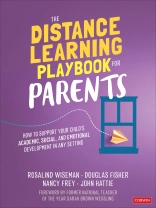We are in this together and will get through this together
Parent involvement has always been a vital part of any child’s education, but the pandemic and resulting remote instruction require that parents and educators partner at a deeper level.
Following the tremendous success of The Distance Learning Playbook, K-12, education authorities Doug Fisher, Nancy Frey, and John Hattie have teamed up with New York Times bestselling author and parenting expert Rosalind Wiseman to bring you the consummate guide to support your child′s academic, social, and emotional development in any learning environment – while not overwhelming you in the process.
This essential guide will arm you with the tools and insight to
- Create an environment conducive to learning, establish routines, and most importantly, take care of yourself and your child
- Maximize the time you spend supporting learning by focusing on what is proven to work best in education
- Help your child develop the cognitive attitudes and habits that foster creativity, critical thinking, and increased responsibility for their learning
- Support the development of your child’s social and emotional learning skills, including the ability to navigate social interactions, build friendships, and regulate emotions at a time when they have never been more important to have, and more challenging to maintain
Содержание
Foreword
Letter From the Authors
Acknowledgments
How to Use This Book
Hold Up! Please Read This!
Distance, Remote, and Blended Learning
1. THE BASICS
Establish Routines
Create a Learning Environment
Learn the Learning Management System
Follow Zoom Etiquette
Ensure That Your Children Sleep
Monitor Screen Time
Communicate With Teachers
Take Care of Yourself
2. THE VALUE OF . . .
The Value of Reading Volume
The Value of Reading Widely
The Value of Reading Aloud
The Value of Vocabulary Games
The Value of Oral Language Development
The Value of Foundational Reading Skills: Phonemic Awareness
The Value of Foundational Reading Skills: Alphabetics and Phonics
The Value of Foundational Reading Skills: Fluency
The Value of Writing Across the Day
The Value of Scaffolded Writing Experiences
The Value of Mathematics Across the Day
The Value of Supplemental Mathematics Instruction
The Value of Arts and Music
The Value of Guiding, Not Telling
The Value of Wait Time
The Value of Practice
3. THE PRINCIPLES OF WELL-BEING
Social Emotional Learning Is Not Just Soft Skills
Happiness
The Power of Dignity
Separating Dignity From Respect
Putting Principles Into Action
Understanding Emotional Regulation
Emotional Granularity
Anxiety
Self-Compassion
Managing Conflicts
Friendships in COVID-19
Teasing: It’s Complicated
Bullying
Communication With Other Parents
Pod Teaching: Learning Pods
4. THE MINDFRAMES
MINDFRAMES FOR STUDENTS
Student Mindframe 1: Know your current level of understanding.
Student Mindframe 2: Know where you are going and have the confidence to take on the challenge.
Student Mindframe 3: Select tools to guide your learning.
Student Mindframe 4: Seek feedback and recognize that errors are opportunities to learn.
Student Mindframe 5: Monitor your progress and adjust your learning.
Student Mindframe 6: Recognize your learning and teach others.
THE 10 MINDFRAMES FOR FAMILIES
Family Mindframe 1: I am an evaluator of my impact on my children’s learning.
Family Mindframe 2: I see the power of collaborating with others in parenting our children.
Family Mindframe 3: I value what my child brings to the family and world.
Family Mindframe 4: I understand the centrality of my child.
Family Mindframe 5: I have appropriately high expectations.
Family Mindframe 6: I listen, build trust, and know how to gradually release responsibility.
Family Mindframe 7: I know the balancing act between developing autonomy, relatedness, and competence.
Family Mindframe 8: I appreciate the power of feedback and the place for praise as well as errors.
Family Mindframe 9: I know how to work with the school.
Family Mindframe 10: I am a parent, not a schoolteacher.
References
Index
About the Authors
Об авторе
John Hattie, Ph D, is an award-winning education researcher and best-selling author with nearly thirty years of experience examining what works best in student learning and achievement. His research, better known as Visible Learning, is a culmination of nearly thirty years synthesizing more than 2, 100 meta-analyses comprising more than one hundred thousand studies involving over 300 million students around the world. He has presented and keynoted in over three hundred international conferences and has received numerous recognitions for his contributions to education. His notable publications include Visible Learning, Visible Learning for Teachers, Visible Learning and the Science of How We Learn; Visible Learning for Mathematics, Grades K-12; and 10 Mindframes for Visible Learning.












